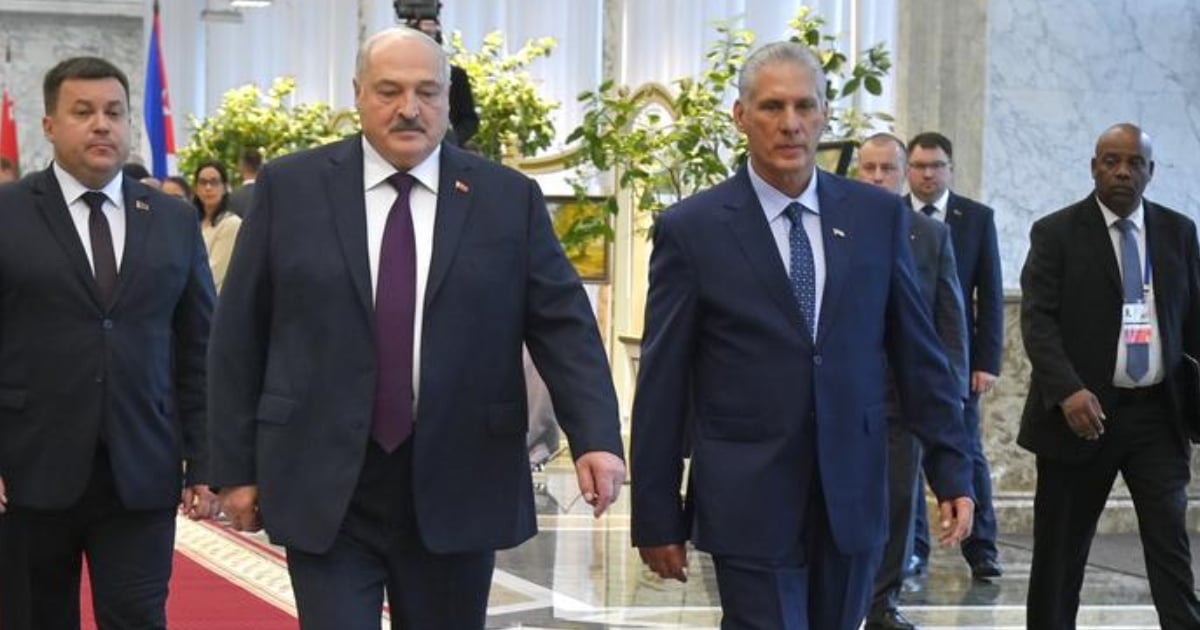Amid massive blackouts, basic shortages, and growing social discontent on the Island, the Cuban leader Miguel Díaz-Canel has begun an official visit to Belarus, where he was received on Wednesday by the dictator Alexander Lukashenko with the aim of strengthening bilateral relations and advancing new economic agreements.
From Minsk, Lukashenko stated that both nations, united by Western sanctions and authoritarian views of governance, have identified “promising” areas of cooperation, including the food industry, joint production of agricultural machinery, biotechnology, mining, energy, and the healthcare sector.
According to the state agency BELTA, cited by EFE, the Belarusian leader also proposed supplying raw materials and sharing technology for the production of dairy and meat products in Cuba.
Díaz-Canel, accompanied by a large delegation that includes his wife Lis Cuesta, expressed his “political will” to strengthen ties with one of the closest allies of Vladimir Putin’s regime, and conveyed a personal greeting from Raúl Castro.
During his two-day stay after flying on a plane from Venezuela, the Cuban leader will also participate in the summit of the Supreme Council of the Eurasian Economic Union (EEU), a regional block that includes Russia, Belarus, Armenia, Kazakhstan, and Kyrgyzstan.
But while the presidential delegation discusses biotechnology and clinics abroad, millions of Cubans face daily power outages, which in some areas last up to 24 hours, without guaranteed access to food, drinking water, or medications.
The contrast between Díaz-Canel’s international diplomatic agenda and the domestic situation has sparked criticism on social media and independent media, where many Cubans question the leader’s tour while the country crumbles in slow motion.
A tour with an ideological focus
This is Díaz-Canel’s second official visit to Belarus—the first was in 2019—and it solidifies his strategic alignment with authoritarian regimes allied with Moscow.
In 2020, Cuba was accepted as an observer country of the Eurasian Economic Union, which the regime has presented as a geopolitical achievement, although the actual benefits for the population have yet to materialize.
Just as in his selective condemnation of the U.S. bombing of facilities in Iran—while remaining silent on Russian nuclear threats or systematic violations in allied countries—Díaz-Canel opts for a diplomacy that is more symbolic than effective, focused on convenient political alliances and on projecting external legitimacy while facing increasingly fragile internal legitimacy.
Frequently asked questions about Díaz-Canel’s visit to Belarus and the situation in Cuba
The purpose of Díaz-Canel’s visit to Belarus is to strengthen bilateral relations and advance new economic agreements, particularly in areas such as the food industry, biotechnology, mining, energy, and the health sector. This visit also aims to consolidate Cuba’s strategic alliances with like-minded regimes, such as that of Alexander Lukashenko, in a context of international sanctions and criticism for human rights violations.
While Díaz-Canel is on his international tour, the Cuban population is facing a severe energy crisis with blackouts lasting up to 24 hours, shortages of food and medicine, and increasing social discontent. This contrast has sparked criticism on social media and independent media, where the relevance of these international visits is being questioned while the country is experiencing a critical situation.
Cuba is seeking to strengthen alliances in sectors such as biotechnology, health, agricultural machinery production, and the food industry. Cooperation includes the supply of raw materials and technology for the production of dairy and meat products in Cuba, as well as the modernization of agricultural equipment and the establishment of assembly centers. These alliances are part of a strategy to diversify economic and political relations with other authoritarian regimes.
Díaz-Canel’s visit has been criticized for taking place in the context of a severe internal crisis in Cuba, where the population is suffering from blackouts, resource shortages, and growing social discontent. Additionally, there are questions regarding the Cuban leader’s pursuit of alliances with authoritarian regimes, which heightens skepticism about whether these relationships will result in real benefits for Cubans.
